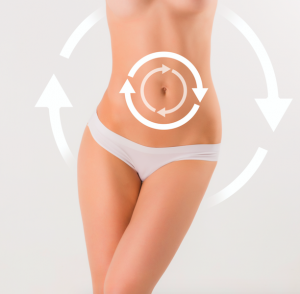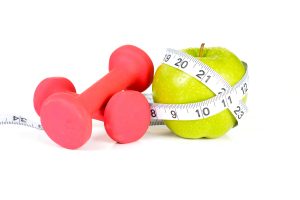17 Jan Weight Gain During Menopause
Weight Gain During Menopause: How to Fight Back
Growing in age brings in a number of debilities and other health challenges.  While some health problems can easily be coped with, weight gain during menopause is something that seems inevitable! This is especially true for women going through menopause. It’s quite common for women to gain extra weight around the transition into menopause. Apart from mood swings and hot flashes, menopause brings some extra pounds that appear difficult to control. In fact, according to the National Heart, Lung, and Blood Institute, women put on an average of 5 pounds during menopause. Some might even gain as much as 15 to 25 pounds. However, this doesn’t mean you can’t do anything about it. By leading an active lifestyle and adopting healthy eating habits, you can definitely reverse the negative outcomes of menopause, including weight gain.
While some health problems can easily be coped with, weight gain during menopause is something that seems inevitable! This is especially true for women going through menopause. It’s quite common for women to gain extra weight around the transition into menopause. Apart from mood swings and hot flashes, menopause brings some extra pounds that appear difficult to control. In fact, according to the National Heart, Lung, and Blood Institute, women put on an average of 5 pounds during menopause. Some might even gain as much as 15 to 25 pounds. However, this doesn’t mean you can’t do anything about it. By leading an active lifestyle and adopting healthy eating habits, you can definitely reverse the negative outcomes of menopause, including weight gain.
How Menopause Affects Women’s Weight Gain
 Although there is no scientific evidence that menopause itself is solely responsible for weight gain, the changes that a woman’s body experiences during this transition can be the obvious reasons. During this phase, not only does your menstrual cycle finally stop but your body’s metabolism naturally slows down as well. As a result, your lean body mass starts decreasing while body fat starts accumulating. What makes the situation even more complex is the lowering of estrogen hormone levels which can cause fat buildup to shift from the thighs and hips into the abdominal area. Because of the lack of estrogen hormones, your body doesn’t metabolize starches and blood sugar as effectively (increasing fat accumulation and making it difficult to lose weight!)
Although there is no scientific evidence that menopause itself is solely responsible for weight gain, the changes that a woman’s body experiences during this transition can be the obvious reasons. During this phase, not only does your menstrual cycle finally stop but your body’s metabolism naturally slows down as well. As a result, your lean body mass starts decreasing while body fat starts accumulating. What makes the situation even more complex is the lowering of estrogen hormone levels which can cause fat buildup to shift from the thighs and hips into the abdominal area. Because of the lack of estrogen hormones, your body doesn’t metabolize starches and blood sugar as effectively (increasing fat accumulation and making it difficult to lose weight!)
There are several other factors that can contribute to weight gain after menopause — such as inactive lifestyle, not having enough sleep, bad eating habits and some genetic factors. It is to be noted that weight gain related to menopause doesn’t just happen overnight. Rather, it is more gradual. However, poor lifestyle habits and other factors can speed up the process.
Other Causes of Weight Gain During Menopause
It isn’t always menopause that causes you to gain that extra weight. During this phase, some other factors can add to the total amount of weight gained. Some of them include:
- Stress
- Not getting enough sleep
- Less/not enough exercise
- Sudden family changes
- Quitting your job
- Relationship problems
- Death of a loved one
- Quitting smoking
- Frequent consumption of alcohol
- Certain medications, such as antidepressants
- Genetics
These don’t ONLY happen during the menopausal phase; these factors can affect your health at other times in life, too.
Complications Associated With Menopause-Related Weight Gain
If a woman puts on considerable weight during menopause, it can pose potential serious consequences to your health such as:
- Depression
- High Blood Pressure
- Breast cancer
- Type 2 diabetes
- Heart disease
If you are already suffering from chronic disease such as hypothyroidism or type 2 diabetes, weight gain can worsen your symptoms.
Foods That Contribute to Weight Gain During Menopause
Fatty Meats: Women going through menopause can put on 8 to 15 pounds weight in the first two years if they aren’t leading a healthy lifestyle. In order to avoid this, you should limit your intake of overly-fatty and any processed meats. When you are above 40, your fat consumption should be less than 20 percent of your daily diet. This means instead of having beef brisket, you should choose a grilled chicken breast, which contains less fat.
Sugary Foods: By limiting your consumption of sugary foods, you can manage your weight gain symptoms and fight fatigue. When you have surpassed the age of 40, you should limit your sugar intake. This means you have to say NO! to doughnuts, cakes, chocolates and other sugary sweets. You should also avoid sugary drinks, like juice and soda. Just keep your focus more on fruits, veggies, and plain water.
Refined Carbohydrates: Refined carbohydrates such as white bread, rice, pasta, and potatoes are high-carb foods that also contribute to weight gain, fatigue, and mood swings. Hence, if you want to avoid excessive weight gain, replace starchy-carb foods with high-fiber carbs like fruits and vegetables.
Alcohol: As it was mentioned before, low levels of estrogen hormones slows down your body’s metabolism. Excessive consumption of alcohol worsens the situation because it slows down your body’s metabolism more than 70 percent. It also triggers weight gain and raises your cortisol levels (a stress hormone that ruins your sleep and contributes to night sweats and hot flashes). A glass of wine once in a while is fine, but a regular habit of two+ drinks a day can add calories to your diet and contribute to menopause symptoms.
Processed Foods: Processed foods are causing worldwide weight gain. So whether you are going through menopause or not, they must be avoided. Processed foods are processed with chemicals and sugars that are devastating to our health. These foods are high in refined carbs and sugar – both which increase blood sugar levels, contributing toward fatigue, moodiness, and weight gain. Diets rich in processed foods may also deteriorate bone health. Processed foods are made to keep eating — you can eat more and more and you feel like you never get enough!
How Exercise Helps with Weight Loss After Menopause
 The more you move, the less weight you’ll gain. Whether you are going through peri-menopause phase or you are looking to lose weight post-menopause, exercising is critical for maintaining a healthy weight. Strength training and low-impact aerobic activities such as swimming, aerobics, cycling, tennis, and dance can help you shed extra pounds and maintain your body’s weight. It’s great if you are fit enough to perform vigorous aerobic activities such as jogging and swimming, otherwise, you can perform the moderate aerobic activity, such as brisk walking. As you gain muscle, your body’s
The more you move, the less weight you’ll gain. Whether you are going through peri-menopause phase or you are looking to lose weight post-menopause, exercising is critical for maintaining a healthy weight. Strength training and low-impact aerobic activities such as swimming, aerobics, cycling, tennis, and dance can help you shed extra pounds and maintain your body’s weight. It’s great if you are fit enough to perform vigorous aerobic activities such as jogging and swimming, otherwise, you can perform the moderate aerobic activity, such as brisk walking. As you gain muscle, your body’s  metabolism speeds up and it starts to burn calories more efficiently. This makes it easier to control your weight.
metabolism speeds up and it starts to burn calories more efficiently. This makes it easier to control your weight.
While improving your lifestyle and dietary changes can definitely help you counteract the effects of menopause, prevention is always better than cure. If you start working on your health and fitness now, it will definitely pay you in the future and you will have fewer chances of weight gain.
Be Happy… Be Healthy… Be FIT!
-Natalie Jill
